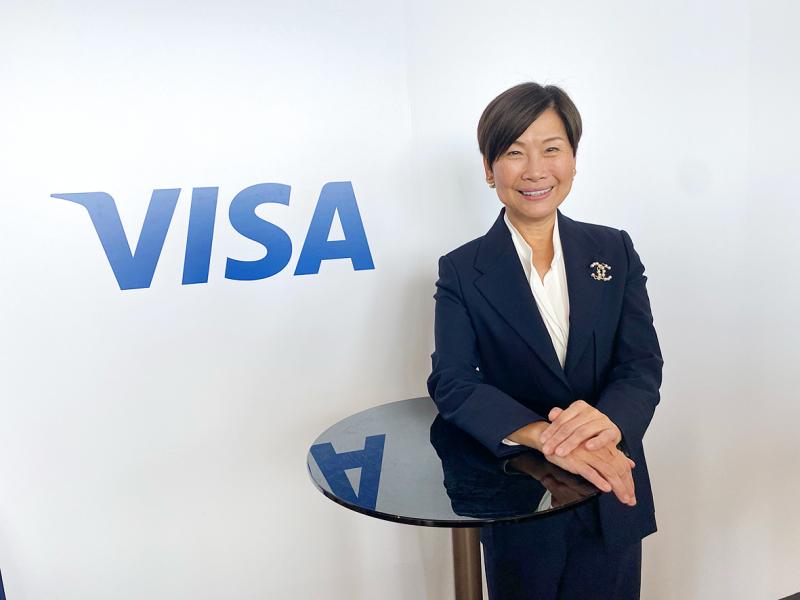Visa Taiwan Co (台灣威士卡) is to focus on providing new cross-border payment solutions, issuing debit cards for young people and collaborating with the cryptocurrency sector to boost its competitiveness, general manager Michelle Jao (趙麗芳) said yesterday.
As parent Visa Inc has launched a business-to-business (B2B) payment solution — Visa B2B Connect — to facilitate quick cross-border payments using blockchain technology, Visa Taiwan has applied with the Financial Supervisory Commission (FSC) to introduce the service to local businesses, Jao told a media briefing in Taipei.
The service, which the commission is reviewing, is available in more than 100 countries, she said.

Photo: Kao Shih-ching, Taipei Times
The company plans to issue debit cards to young people, such as university students, as they are generally not ready or eligible to use credit cards, Jao said, citing a survey in July showing that nearly 70 percent of people younger than 23 had never tried non-cash payment tools.
“The number was unexpectedly high,” she said.
The issuance of debit cards has risen at a double-digit rate this year, Jao said, adding that hopefully more young people would use Visa’s other payment tools as well.
Meanwhile, Visa has collaborated with more than 50 crypto wallets or trading platforms worldwide to allow people to buy cryptocurrencies with their Visa cards, Jao said.
The value of cryptocurrency-related transactions made with Visa cards surpassed US$1 billion in the first half of this year, she said.
In Taiwan, the company would observe how local exchanges conform to new regulations against money laundering and how robust cryptocurrency transactions are before furthering local collaborations, she said.
A company survey showed that about 74 percent of respondents had heard of cryptocurrencies, but only 8 percent had invested in them, so the room for growth is substantial, she said.
As the central bank plans to develop its own digital currency, Visa Taiwan is studying how it could bridge traditional and digital currencies in its network, Jao said, adding that the company would be ready to go if the central bank launches a digital currency.

In Italy’s storied gold-making hubs, jewelers are reworking their designs to trim gold content as they race to blunt the effect of record prices and appeal to shoppers watching their budgets. Gold prices hit a record high on Thursday, surging near US$5,600 an ounce, more than double a year ago as geopolitical concerns and jitters over trade pushed investors toward the safe-haven asset. The rally is putting undue pressure on small artisans as they face mounting demands from customers, including international brands, to produce cheaper items, from signature pieces to wedding rings, according to interviews with four independent jewelers in Italy’s main

Macronix International Co (旺宏), the world’s biggest NOR flash memory supplier, yesterday said it would spend NT$22 billion (US$699.1 million) on capacity expansion this year to increase its production of mid-to-low-density memory chips as the world’s major memorychip suppliers are phasing out the market. The company said its planned capital expenditures are about 11 times higher than the NT$1.8 billion it spent on new facilities and equipment last year. A majority of this year’s outlay would be allocated to step up capacity of multi-level cell (MLC) NAND flash memory chips, which are used in embedded multimedia cards (eMMC), a managed

Japanese Prime Minister Sanae Takaichi has talked up the benefits of a weaker yen in a campaign speech, adopting a tone at odds with her finance ministry, which has refused to rule out any options to counter excessive foreign exchange volatility. Takaichi later softened her stance, saying she did not have a preference for the yen’s direction. “People say the weak yen is bad right now, but for export industries, it’s a major opportunity,” Takaichi said on Saturday at a rally for Liberal Democratic Party candidate Daishiro Yamagiwa in Kanagawa Prefecture ahead of a snap election on Sunday. “Whether it’s selling food or

In the wake of strong global demand for AI applications, Taiwan’s export-oriented economy accelerated with the composite index of economic indicators flashing the first “red” light in December for one year, indicating the economy is in booming mode, the National Development Council (NDC) said yesterday. Moreover, the index of leading indicators, which gauges the potential state of the economy over the next six months, also moved higher in December amid growing optimism over the outlook, the NDC said. In December, the index of economic indicators rose one point from a month earlier to 38, at the lower end of the “red” light.